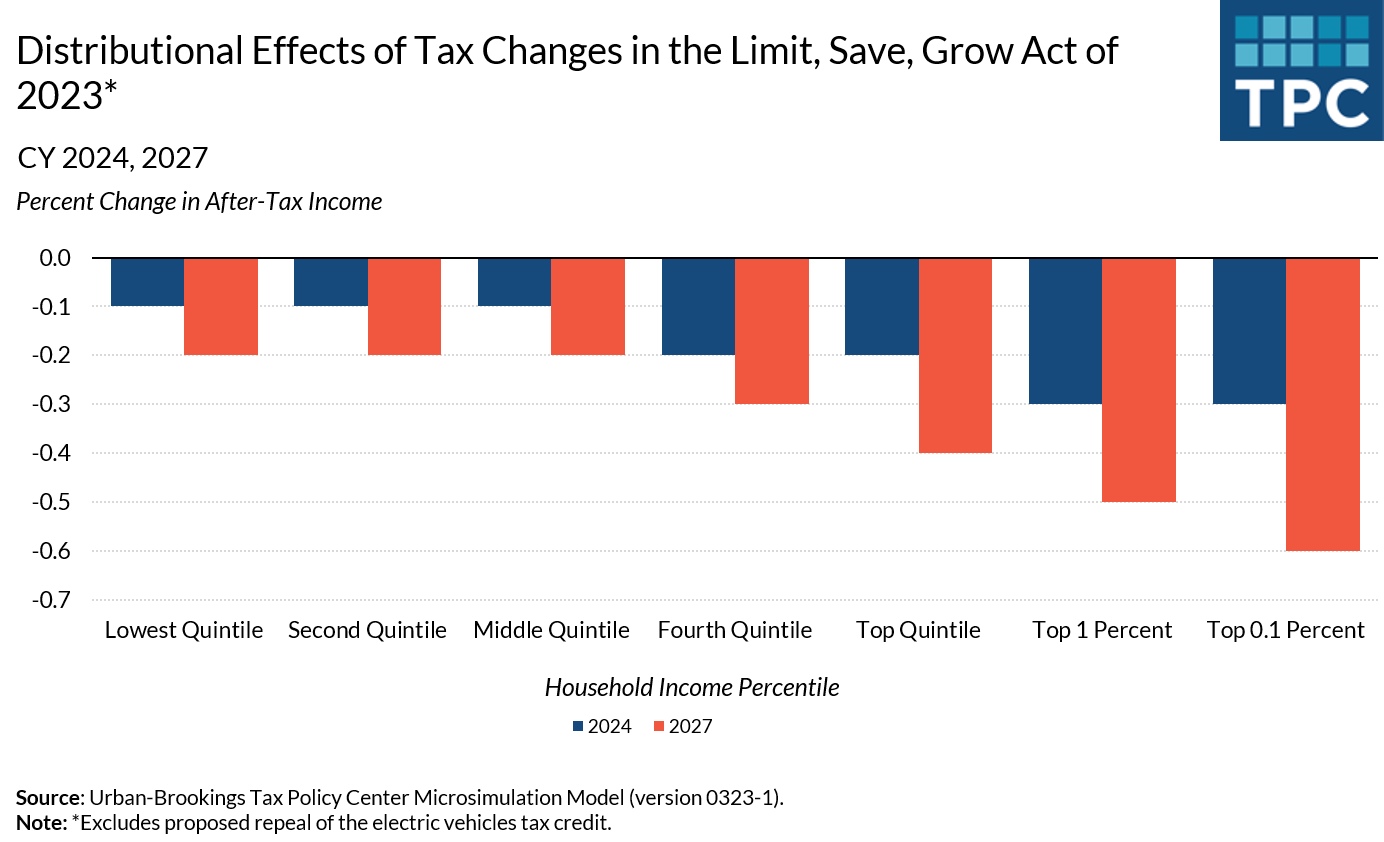House Republicans on April 26 passed legislation on a party-line vote a bill that would rescind many Inflation Reduction Act (IRA) clean energy tax incentives in exchange for a temporary increase in the federal debt limit. A new Tax Policy Center analysis finds that repealing those tax breaks would reduce after-tax incomes in 2024 by an average of 0.2 percent ($810) for those in the top 20 percent of earners (who make at least $195,000 a year), while low- and middle-income households would face smaller increases.
The IRA corporate and individual income tax breaks benefit both producers and consumers of clean energy products. They apply to investments in solar and wind power, energy-efficient home improvements, and other carbon-reducing activities. The projected cost of these incentives has grown substantially since the congressional Joint Committee on Taxation last scored the IRA last year.
In the Limit, Save, Grow Act, House Republicans would leave intact IRA incentives for biofuels and carbon capture. TPC also did not include repealing tax breaks for electric vehicle purchases in its analysis since JCT has not completed a revenue estimate for that provision.
Under the bill, the top 1 percent of taxpayers (with incomes of roughly $1 million or more) would see their after-tax incomes fall by 0.3 percent ($6,400) on average in 2024. The top 0.1 percent of taxpayers (with incomes greater than $4.3 million) would face the biggest increase in tax burden: Their after-tax incomes would fall by an average of $31,700 in 2024.

The bottom two income quintiles (those earning $60,000 or less) would see smaller increases, with the average household in those groups seeing a reduction in after-tax income of about 0.1 percent ($40 or less).
The tax burden from repealing the incentives would grow in 2027, particularly for the wealthy. For the top 1 percent, after-tax incomes would drop by an average of $11,700 (0.5 percent), and top 0.1 percent would see an average tax hike of $55,700 (0.6 percent). These estimates account for the proposed repeal of both corporate and individual income tax incentives. Tables on just the effect of repealing non-corporate incentives are available here for 2024 and here for 2027.
Balancing progressive taxation with climate action
The political dynamics here are unusual. Republicans normally oppose legislation that scores as a tax increase, which my colleague Howard Gleckman explores here.
Meanwhile, although the tax increases in this measure tilt toward the wealthy, President Biden and Senate Democrats have said the IRA isn’t going anywhere and further negotiations will be required.
On the Democratic side, the tax incentives are about more than the revenue. The primary aim is reducing greenhouse gas emissions in the US to help slow the rate of climate change. TPC’s tax model does not assess those effects. However, the Rhodium Group and Resources For the Future have previously estimated how the IRA could reduce emissions in addition to lowering the costs of energy and other goods and services that would benefit household finances.
The renewed debate over subsidies for clean energy does provide an opportunity to revisit whether a carbon tax could achieve many of the same policy goals without adding to federal deficits. Although politically challenging, a carbon tax has efficiency advantages and, as previous TPC analysis has shown, could be somewhat progressive if paired with a rebate or dividend.
Other considerations
The Limit, Save, Grow Act also would make substantial cuts in federal spending, which TPC does not analyze. For instance, the legislation would implement tighter work restrictions for Medicaid and the Supplemental Nutrition Assistance Program. The Congressional Budget Office recently estimated that the Medicaid work requirements would save the federal government about $109 billion. However, CBO also said it would increase by 600,000 the number of people without health insurance and impose additional health care costs on states to compensate for reduced federal support.
In total, the House Republican plan would reduce deficits by about $4.5 trillion over the next decade. While the clean energy tax breaks are just one piece of the bill, their repeal would generally be progressive.
With Democrats staunchly opposed to backsliding on broader emissions goals and House Republicans planning to push for more individual and corporate tax cuts this year, this debate and negotiations over preventing a catastrophic debt default are only just beginning.
